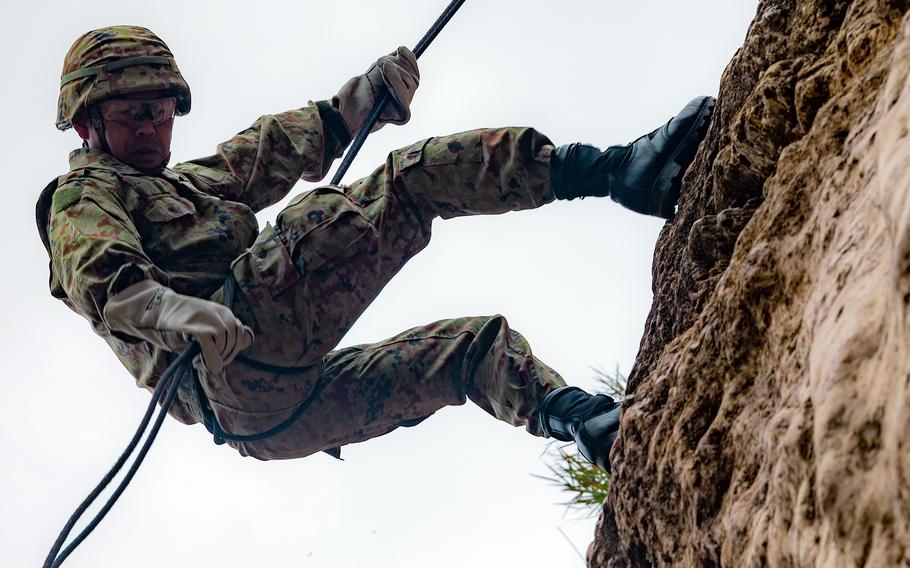
A member of Japan's Amphibious Rapid Deployment Brigade rappels down a cliff at the Jungle Warfare Training Center on Okinawa, Feb. 26, 2024. (Tyler Andrews/U.S. Marine Corps)
Japan’s amphibious army unit will join annual U.S. Marine Corps rotations to Australia’s Northern Territory, the three allies’ top civilian defense leaders said Sunday.
Lloyd Austin, in what is likely his last trip to the region as U.S. defense secretary, along with Australian Defence Minister Richard Marles and Japanese Defense Minister Gen Nakatani, announced the plan when they met at the northern Australian port of Darwin.
The United States has sent growing numbers of troops to Australia since 250 Marines kicked off annual rotations to Darwin in 2012. Marine Rotational Force-Darwin, which operates in Australia from April to October, has grown to more than 2,000 members.
Starting next year, they will be joined by members of Japan’s relatively new Amphibious Rapid Deployment Brigade, the three ministers said in a joint statement following their meeting.
The announcement comes amid concerns about China’s military buildup and potential for conflict over disputes in the Taiwan Strait and in the South and East China Seas.
The ministers, in their statement, called for peaceful resolution of issues in the Taiwan Strait and expressed concern about China’s “destabilizing actions,” including dangerous conduct against Philippine and other coastal state vessels.
The three nations will conduct annual amphibious training in northern Australia and elsewhere in the Indo-Pacific, beginning with next year’s large-scale biennial Talisman Sabre drills in Australia, the defense ministers said.
The last exercise involved 30,000 mostly U.S. and Australian troops training over 14 days with smaller contingents from Europe and across the Pacific.
Japan will, from next year, increase its contribution to Talisman Sabre, as well as another annual exercise in Australia, Southern Jackaroo, the ministers’ joint statement said.
Meanwhile, Australian troops will train alongside U.S. and Japanese forces during the Orient Shield exercise in Japan from next year and enhance their participation in other drills there, including Yama Sakura, Keen Edge and Keen Sword, the ministers said.
“We continue to grow trilateral intelligence, surveillance, and reconnaissance cooperation in the Indo-Pacific region as a priority,” the statement said.
The allies also plan enhanced trilateral airpower cooperation, according to the statement.
“Our countries intend to continue to work together to strengthen regional deterrence, including through cooperating on a networked air and missile defense architecture to counter the growing range of threats throughout the Indo-Pacific,” the statement said.
Japan’s consultations with members of the AUKUS – Australia, United Kingdom and United States – pact are welcome with the initial focus on improved cooperation with Japan’s maritime drones, the statement said.
Austin travels next to the Philippines, Laos and Fiji, according to a Department of Defense statement Tuesday.